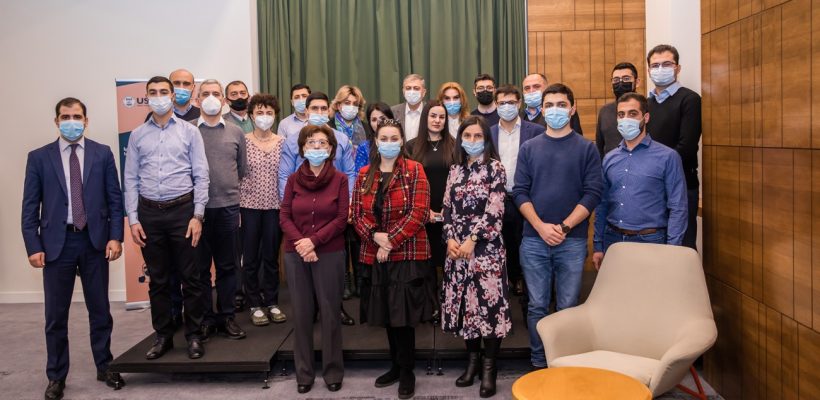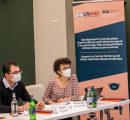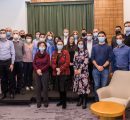
Stakeholder Meeting on the Economic Impact of the COVID-19 Pandemic in Armenia
3 min readYEREVAN, Armenia — The American University of Armenia (AUA) Fund, in collaboration with the Ministry of Health of the Republic of Armenia, is implementing the United States Agency for International Development (USAID)-funded project, Support to Control COVID-19 and Other Infectious Disease Outbreaks. The project aims to strengthen Armenia’s national capacity to control COVID-19 and other infectious disease outbreaks and emergencies of potential public health concern. The work implemented through this project aligns with, and is advancing, the Armenian Government’s Public Health Emergency Preparedness and Response Strategy.
On December 21, 2021, a stakeholder meeting was organized jointly by the AUA Turpanjian College of Health Sciences (CHS) (previously the School of Public Health) and the Manoogian Simone College of Business and Economics (CBE). The participants were representatives from the Ministry of Finance, Ministry of Economy, Ministry of Health, the Central Bank of Armenia, and the Small and Medium Entrepreneurship Development National Center. During the meeting, the AUA team presented findings from an impact assessment of COVID-19 on the economy, conducted as part of the project, as well as results of the evaluation of the government’s COVID-19 impact mitigation support programs for small and medium enterprises, and findings of an evaluation of the financial stress and anxiety in the Armenian labor market as a result of the pandemic. Each presentation was followed by a discussion session that provided participants with the opportunity to ask questions, exchange ideas and develop recommendations for the government to be better prepared for emergency responses.
The results from these studies have shown that the Government of Armenia responded to COVID-19 outbreak by implementing 25 economic and social support measures, which were intended to mitigate the adverse effects of the pandemic on the economy. However, the studies revealed that not all programs have been effective, and some have not reached their intended target groups. These findings were validated by the stakeholders participating in the meeting, who also acknowledged that in the interest of being responsive to the urgent needs at the time, some programs were not as thoroughly designed had there been more time.
Based on these findings and discussions, the participants suggested that the government develop integrated data systems for use across different government agencies. The broad availability of shared data would enable the government access to more accurate and timely data, which in turn, would ensure that interventions- especially in times of urgency- are most effectively and appropriately designed and implemented.
Another suggested solution included ensuring capacity building/training of government staff in key areas, including data management, monitoring and evaluation. The studies also identified the need for all government agencies to have a clearly defined emergency preparedness and response plan in place at all times. Such a plan should set forth specific roles and responsibilities of each ministry, personnel, in the event future emergency events take place.
At the conclusion of the meeting, the stakeholders expressed interest in having similar meetings more regularly in the future. As one stakeholder stated: “Such meetings among colleagues from different ministries and academia should be conducted more often as they provide the platform where issues could be discussed and potential solutions found.”
Participants expressed their commitment to collaborate and support the project staff in strengthening the capacity of the government of Armenia to control COVID-19 and other infectious disease outbreaks and emergencies of potential public health concern.
The next step of the project would include developing an action plan in collaboration with the government of Armenia that will include activities to strengthen capacity to respond to emergency situations of public health concern at national and sub-national levels.
The AUA Turpanjian College of Health Sciences works actively to improve population health and health services in Armenia and the region through interdisciplinary education and development of public health professionals to be leaders in public health, health services research, and evaluation, health care delivery, and management.










